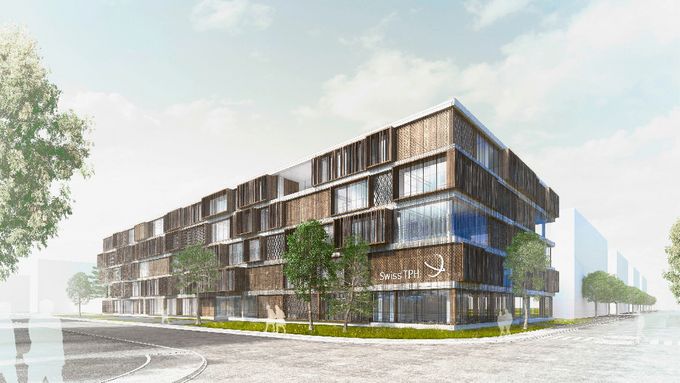Joint Sponsorship by Basel-Stadt and Basel-Landschaft
2015 was a game-changing year for Swiss TPH, with the governments of Basel-Stadt and Basel-Landschaft agreeing in April on the joint support of the institute in the form of a state treaty. After intense political debate, the two cantonal parliaments unanimously approved this proposal. For Swiss TPH, the institutional security provided by the state treaty is of vital importance, and the prerequisite for the construction of new premises in Allschwil.

Visualisation of the new Swiss TPH building in the context of a feasibility study done by Burckhardt + Partner. In 2016 an architecture competition for the new building in Allschwil will take place.
01.06.2016 by Christian Heuss
Joint Sponsorship by Both Cantons
Building on these ideas and preparatory work, the cantonal council of Basel-Stadt proposed to the canton of Basel-Landschaft the concept of joint sponsorship within the framework of partnership negotiations. This would enable Swiss TPH to receive newly built premises on Basel-Landschaft land, while also benefiting from moderate possibilities for future development. The canton of Basel-Landschaft, for its part, agreed to become a sponsor of the institute.
This idea was presented to the federal government in November 2014 and received broad support. The State Secretariat for Education, Research and Innovation, the cantons of Basel-Stadt and Basel-Landschaft as well as the University of Basel decided on a joint approach. According to this agreement, the two half-cantons would become joint sponsors of the institute in a state treaty drafted along the lines of the model of the university treaty. The two sponsor cantons would become the institute’s owners, each with equal rights of co-determination.
The two governments went on to draft a state treaty, which they jointly approved in June 2015 and passed on for consultation. According to the state treaty, the two cantons will contribute around 3.6 million Swiss francs each per year to the operating costs of the institute’s teaching and research activities for the period from 2017 to 2020.
“It was not easy for the government of Basel-Stadt to agree to the proposal of moving the institute to Basel-Landschaft after 70 years in the city,” said Basel-Stadt Director of Education Christoph Eymann to SRF Regionaljournal Basel in April 2015. “We tried to do something to solve the space problem for the longer term while also securing more funding for the institute.” The government of Basel-Stadt also commented to the media that the joint Swiss TPH sponsorship was a milestone in the university policy of the two cantons.
Broad Political Support for the State Treaty
The government of Basel-Landschaft was delighted with the idea of Swiss TPH relocating to the canton: “Swiss TPH is an outstanding reference for Basel-Landschaft as a business and science location,” said Urs Wüthrich-Pelloli, Director of Education. As an anchor institution of the Switzerland Innovation Park Basel Area, which has since been planned for the Bachgraben site, Swiss TPH may well attract more partners from business and science to this location.
The political debate surrounding the threatened termination of the university treaty in autumn 2015 also had an impact on the discussion concerning the joint sponsorship of Swiss TPH. Following intense discussions at all levels, the submission for 18.2 million Swiss francs in December was ultimately unanimously approved by the cantonal parliament.
“Basel-Landschaft can consider itself fortunate that a major institute of the University of Basel will now be located within the canton,” said SVP spokesperson Caroline Mall in the cantonal parliament. The cantonal parliament of Basel-Stadt voted in February 2016, and was equally unanimous in its support of the joint sponsorship concept. The directorate and all members of Swiss TPH were glad to hear from this commitment in times of economic difficulties.
Planning and Architecture Competition for New Premises in Allschwil
The joint sponsorship means that the legal foundation for the new premises in Allschwil has been laid. A two-stage architecture competition will be held in 2016, with the winning project to be announced by the end of the year. Once the planning and construction process is complete, the institute plans to move by 2020. Travel medicine services, however, will continue to be provided from Socinstrasse in Basel.
With more than 600 employees and postgraduate and undergraduate students, space is now at a premium at Socinstrasse. The laboratories, offices, training rooms and lecture halls are bursting at the seams. The institute is spread over a total of eight properties between Socinstrasse and Missionsstrasse – not a situation conducive to sustainable future development.
In view of this situation, back in 2008 the directorate began – not least with a view to the integration of the institute of Social and Preventive Medicine – to evaluate the possibility of extending its premises. The focus at the time was initially on the neighbouring property at Socinstrasse 55, which belongs to the Bürgerspital. The Sonnenrain nursing home at this address already had plans to relocate to a new building at the edge of the city.
During initial discussions, the Bürgerspital brought another option to the table: a piece of land on the 75,000 square metres Bachgraben development site in the municipality of Allschwil. This gave the institute the opportunity to design a building with offices, laboratories and teaching rooms from scratch based on modern and sustainable principles. Following informal contact between the then Director Marcel Tanner and the two cantons, the idea of locating the institute on Allschwil land opened up the possibility of bringing the canton of Basel-Landschaft on board as a joint sponsor.
In 2013, with a view to assessing the implementation and cost of this new building, the directorate then commissioned the architecture firm Burckhardt + Partner AG to carry out a feasibility study. This study, financed by the R. Geigy Foundation, calculated a sum of approximately 90 million Swiss francs and an area of 10,500 square metres for the construction project.